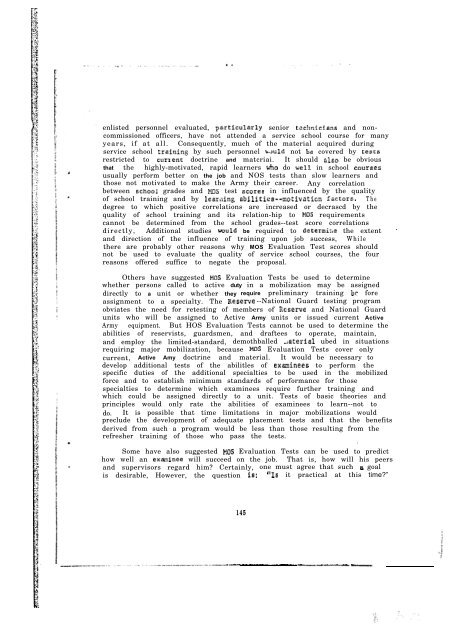Technical Report - International Military Testing Association
Technical Report - International Military Testing Association
Technical Report - International Military Testing Association
You also want an ePaper? Increase the reach of your titles
YUMPU automatically turns print PDFs into web optimized ePapers that Google loves.
enlisted personnel evaluated, particulnrly senior tcc!lnicfans and noncommissioned<br />
officers, have not attended a service school course for many<br />
years, if at all. Consequently, much of the material acquired during<br />
service school :raining by such personnel b.>uld not be covered by teuts<br />
restricted to curxent doctrine and matcriai. It should ail&o be obvious<br />
that the highly-motivated, rapid learners k&o do uell in school courses<br />
usually perform better on the job and NOS tests than slow learners and<br />
those not motivated to make the Army their career. Any correlation<br />
between schoo! grades and MS test acores in influenced by the quality<br />
of school training and by lear,ling abilities--motivnticn factore. The<br />
degree to which positive correlations are increased or decrascd by the<br />
quality of school training and its relation-hip to MOS requirements<br />
cannot be determined from the school grades--test score correlations<br />
directly, Additional studies would be required to determi:;e the extent -<br />
and direction of the influence of training upon job success, While<br />
there are probably other reasons why MOS Evaluation Test scores should<br />
not be used to evaluate the quality of service school courses, the four<br />
reasons offered suffice to negate the proposal.<br />
Others have suggested HOS Evaluation Tests be used to determine<br />
whether persons called to active duty in a mobilization may be assigned<br />
directly to a unit or whether they require preliminary training bc fore<br />
assignment to a specialty. The Reserve --National Guard testing program<br />
obviates the need for retesting of members of Reserve and National Guard<br />
units who will be assigned to Active Army units or issued current Active<br />
Army equipment. But HOS Evaluation Tests cannot be used to determine the<br />
abilities of reservists, guardsmen, and draftees to operate, maintain,<br />
and employ the limited-standard, demothballed ,laterial ubed in situations<br />
requiring major mobilization, because MOS Evaluation Tests cover only<br />
current, Active Amy doctrine and material. It would be necessary to<br />
develop additional tests of the abilitles of exeminees to perform the<br />
specific duties of the additional specialties to be used in the mobilized<br />
force and to establish minimum standards of performance for those<br />
specialties to determine which examinees require further training and<br />
which could be assigned directly to a unit. Tests of basic theories and<br />
principles would only rate the abilities of examinees to learn--not to<br />
do. It is possible that time limitations in major mobilizations would<br />
preclude the development of adequate placement tests and that the benefits<br />
derived from such a program would be less than those resulting from the<br />
refresher training of those who pass the tests.<br />
.<br />
Some have also suggested MS Evaluation Tests can be used to predict<br />
how well an examinee will succeed on the job. That is, how will his peers<br />
and supervisors regard him? Certainly, one must agree that such a goal<br />
is desirable, However, the question is: “Is it practical at this time?”<br />
145









